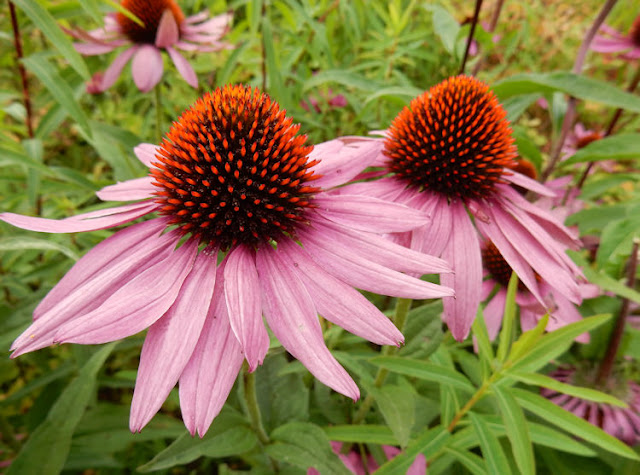 |
| Echinacea (E. purpurea) Photo & Article © Ann Walker |
Echinacea had a long traditional of medicinal use among American’s First peoples and it was taken up as a remedy for infections in a big way by the early American colonists. The herb today is one of the most popular over-the-counter remedy for respiratory infections, including the common cold. Several compounds in Echinacea have been shown to kill microbes, including viruses, and the most important are the alkylamides. As well as having direct broad-spectrum anti-microbial properties, in the laboratory Echinacea shows its ability to enhance immune function, including promoting white blood cells to tackle infective agents.
While the anti-viral effects of Echinacea are seen every day in clinical practice among herbalists, getting clear evidence of the efficacy of the herb for infections through clinical studies has proved difficult. For a start, there are several species of Echinacea used medicinally and while E. purpurea is the most common, some studies have reported on E. angustifolia.
Moreover, human studies have been done both on the leaves and flowers of the plant and on the root, which adds complexity. Regarding E. purpurea root, which is most commonly found in over-the-counter products, a Cochrane systematic review in 2006 (PMID: 16437427), concluded that the aerial parts of E. purpurea showed weak evidence of being effective for naturally acquired colds in adults.
Another team also published a meta-analysis* in 2006 (PMID: 16678640), looking at the effects of the herb after inoculation of the cold virus. In that study, infection rate was 55% higher for people taking placebo compared with those on Echinacea. Furthermore, those taking Echinacea who did contract a cold, suffered reduced symptoms.
There have been other meta-analyses and systematic reviews, some of which, but not all, showed that the herb decreased the odds of developing colds and shortened cold duration. Unfortunately, funding for clinical trials on herbs is becoming more and more difficult to obtain these days, so obtaining proof of efficacy which will stand up to mainstream medical scrutiny will take a long time. While we wait for gold-standard clinical trial evidence we already know that Echinacea in all its forms is a very safe medicine and well tolerated. For many people it is already the go-to remedy for all types of infections.
* Pooled data from several placebo-controlled clinical studies
PMID, PubMed identifier
Ann Walker PhD FCPP MNIMH RNutr
Herbal Practitioner and Nutritionist
Course Director Discovering Herbal Medicine
